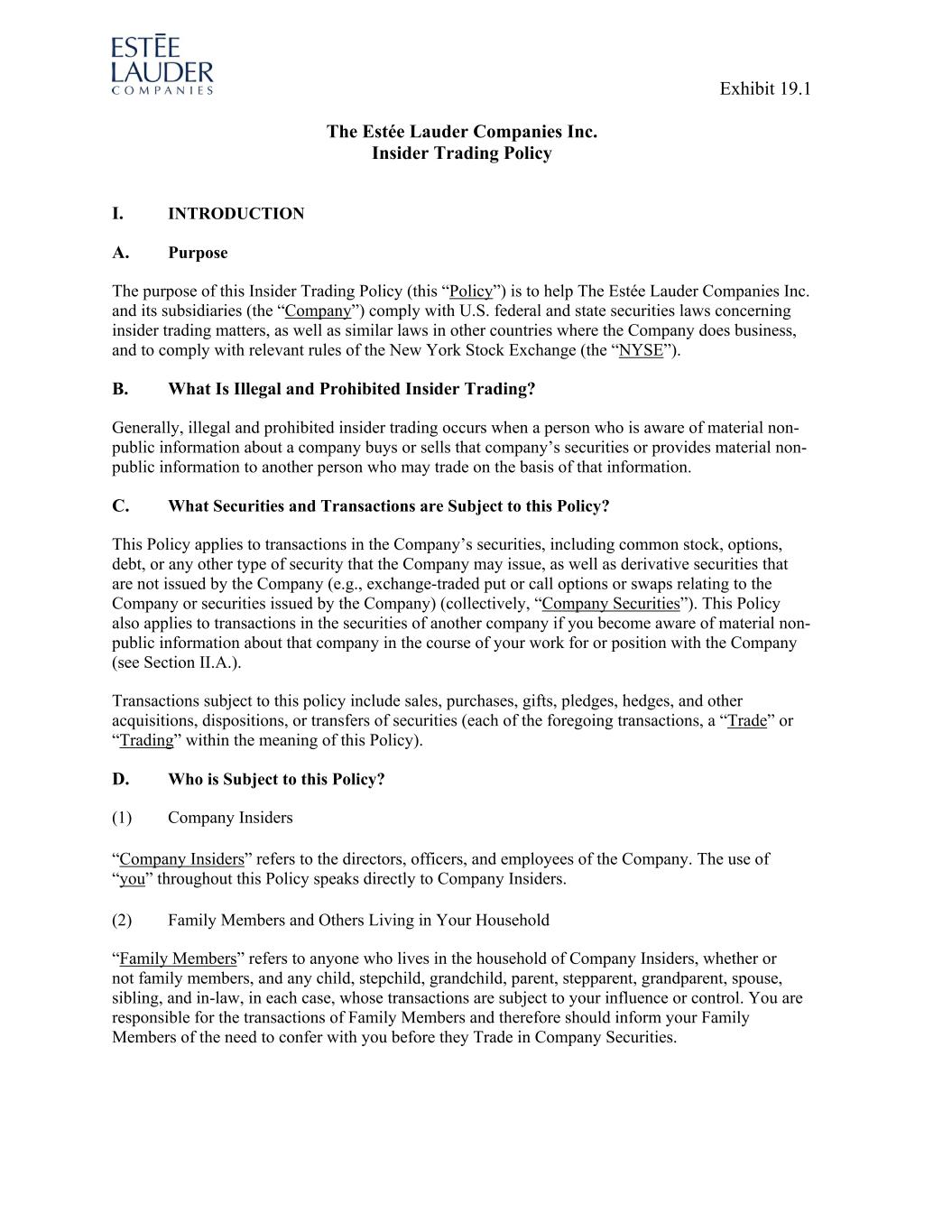
Exhibit 19.1 The Estée Lauder Companies Inc. Insider Trading Policy I. INTRODUCTION A. Purpose The purpose of this Insider Trading Policy (this “Policy”) is to help The Estée Lauder Companies Inc. and its subsidiaries (the “Company”) comply with U.S. federal and state securities laws concerning insider trading matters, as well as similar laws in other countries where the Company does business, and to comply with relevant rules of the New York Stock Exchange (the “NYSE”). B. What Is Illegal and Prohibited Insider Trading? Generally, illegal and prohibited insider trading occurs when a person who is aware of material non- public information about a company buys or sells that company’s securities or provides material non- public information to another person who may trade on the basis of that information. C. What Securities and Transactions are Subject to this Policy? This Policy applies to transactions in the Company’s securities, including common stock, options, debt, or any other type of security that the Company may issue, as well as derivative securities that are not issued by the Company (e.g., exchange-traded put or call options or swaps relating to the Company or securities issued by the Company) (collectively, “Company Securities”). This Policy also applies to transactions in the securities of another company if you become aware of material non- public information about that company in the course of your work for or position with the Company (see Section II.A.). Transactions subject to this policy include sales, purchases, gifts, pledges, hedges, and other acquisitions, dispositions, or transfers of securities (each of the foregoing transactions, a “Trade” or “Trading” within the meaning of this Policy). D. Who is Subject to this Policy? (1) Company Insiders “Company Insiders” refers to the directors, officers, and employees of the Company. The use of “you” throughout this Policy speaks directly to Company Insiders. (2) Family Members and Others Living in Your Household “Family Members” refers to anyone who lives in the household of Company Insiders, whether or not family members, and any child, stepchild, grandchild, parent, stepparent, grandparent, spouse, sibling, and in-law, in each case, whose transactions are subject to your influence or control. You are responsible for the transactions of Family Members and therefore should inform your Family Members of the need to confer with you before they Trade in Company Securities.
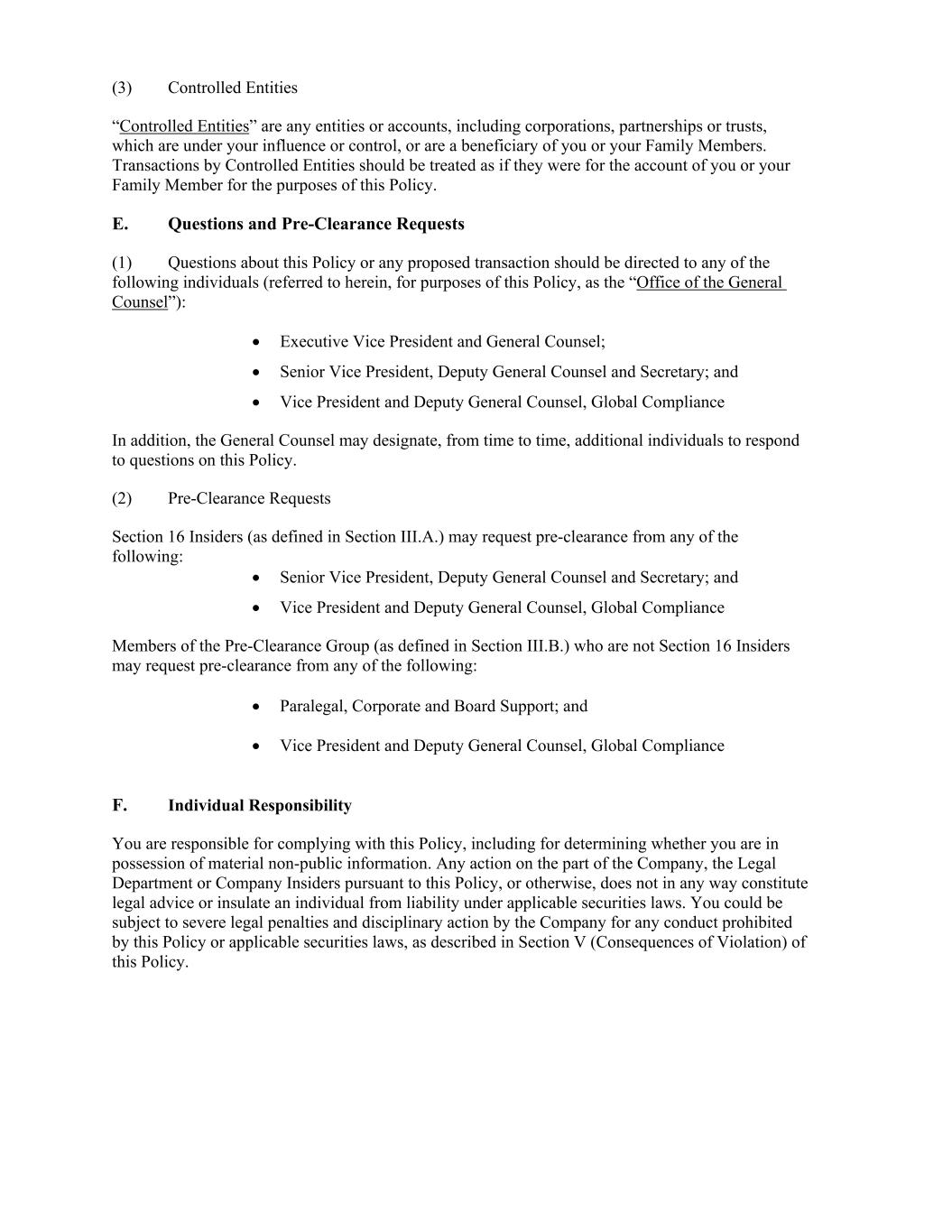
(3) Controlled Entities “Controlled Entities” are any entities or accounts, including corporations, partnerships or trusts, which are under your influence or control, or are a beneficiary of you or your Family Members. Transactions by Controlled Entities should be treated as if they were for the account of you or your Family Member for the purposes of this Policy. E. Questions and Pre-Clearance Requests (1) Questions about this Policy or any proposed transaction should be directed to any of the following individuals (referred to herein, for purposes of this Policy, as the “Office of the General Counsel”): • Executive Vice President and General Counsel; • Senior Vice President, Deputy General Counsel and Secretary; and • Vice President and Deputy General Counsel, Global Compliance In addition, the General Counsel may designate, from time to time, additional individuals to respond to questions on this Policy. (2) Pre-Clearance Requests Section 16 Insiders (as defined in Section III.A.) may request pre-clearance from any of the following: • Senior Vice President, Deputy General Counsel and Secretary; and • Vice President and Deputy General Counsel, Global Compliance Members of the Pre-Clearance Group (as defined in Section III.B.) who are not Section 16 Insiders may request pre-clearance from any of the following: • Paralegal, Corporate and Board Support; and • Vice President and Deputy General Counsel, Global Compliance F. Individual Responsibility You are responsible for complying with this Policy, including for determining whether you are in possession of material non-public information. Any action on the part of the Company, the Legal Department or Company Insiders pursuant to this Policy, or otherwise, does not in any way constitute legal advice or insulate an individual from liability under applicable securities laws. You could be subject to severe legal penalties and disciplinary action by the Company for any conduct prohibited by this Policy or applicable securities laws, as described in Section V (Consequences of Violation) of this Policy.
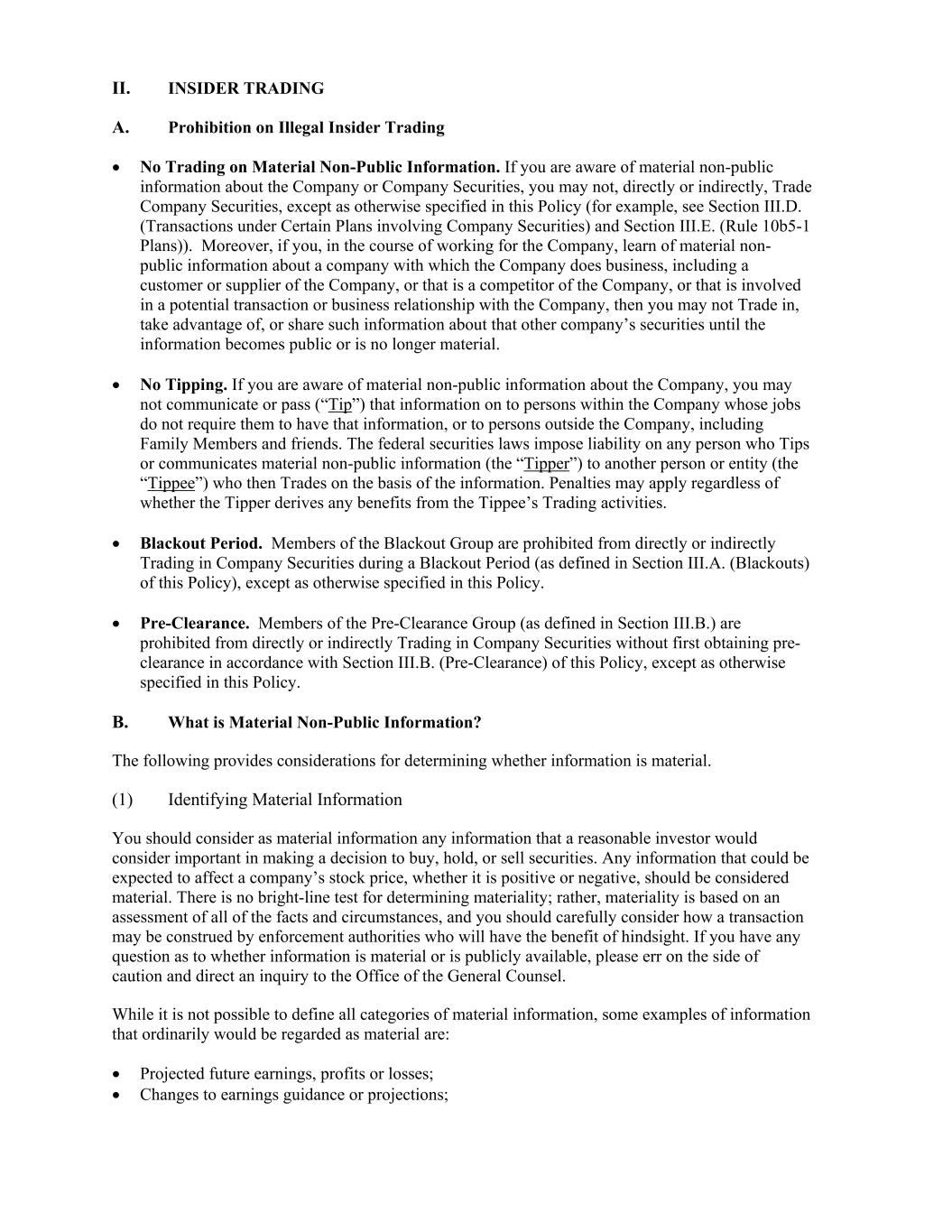
II. INSIDER TRADING A. Prohibition on Illegal Insider Trading • No Trading on Material Non-Public Information. If you are aware of material non-public information about the Company or Company Securities, you may not, directly or indirectly, Trade Company Securities, except as otherwise specified in this Policy (for example, see Section III.D. (Transactions under Certain Plans involving Company Securities) and Section III.E. (Rule 10b5-1 Plans)). Moreover, if you, in the course of working for the Company, learn of material non- public information about a company with which the Company does business, including a customer or supplier of the Company, or that is a competitor of the Company, or that is involved in a potential transaction or business relationship with the Company, then you may not Trade in, take advantage of, or share such information about that other company’s securities until the information becomes public or is no longer material. • No Tipping. If you are aware of material non-public information about the Company, you may not communicate or pass (“Tip”) that information on to persons within the Company whose jobs do not require them to have that information, or to persons outside the Company, including Family Members and friends. The federal securities laws impose liability on any person who Tips or communicates material non-public information (the “Tipper”) to another person or entity (the “Tippee”) who then Trades on the basis of the information. Penalties may apply regardless of whether the Tipper derives any benefits from the Tippee’s Trading activities. • Blackout Period. Members of the Blackout Group are prohibited from directly or indirectly Trading in Company Securities during a Blackout Period (as defined in Section III.A. (Blackouts) of this Policy), except as otherwise specified in this Policy. • Pre-Clearance. Members of the Pre-Clearance Group (as defined in Section III.B.) are prohibited from directly or indirectly Trading in Company Securities without first obtaining pre- clearance in accordance with Section III.B. (Pre-Clearance) of this Policy, except as otherwise specified in this Policy. B. What is Material Non-Public Information? The following provides considerations for determining whether information is material. (1) Identifying Material Information You should consider as material information any information that a reasonable investor would consider important in making a decision to buy, hold, or sell securities. Any information that could be expected to affect a company’s stock price, whether it is positive or negative, should be considered material. There is no bright-line test for determining materiality; rather, materiality is based on an assessment of all of the facts and circumstances, and you should carefully consider how a transaction may be construed by enforcement authorities who will have the benefit of hindsight. If you have any question as to whether information is material or is publicly available, please err on the side of caution and direct an inquiry to the Office of the General Counsel. While it is not possible to define all categories of material information, some examples of information that ordinarily would be regarded as material are: • Projected future earnings, profits or losses; • Changes to earnings guidance or projections;
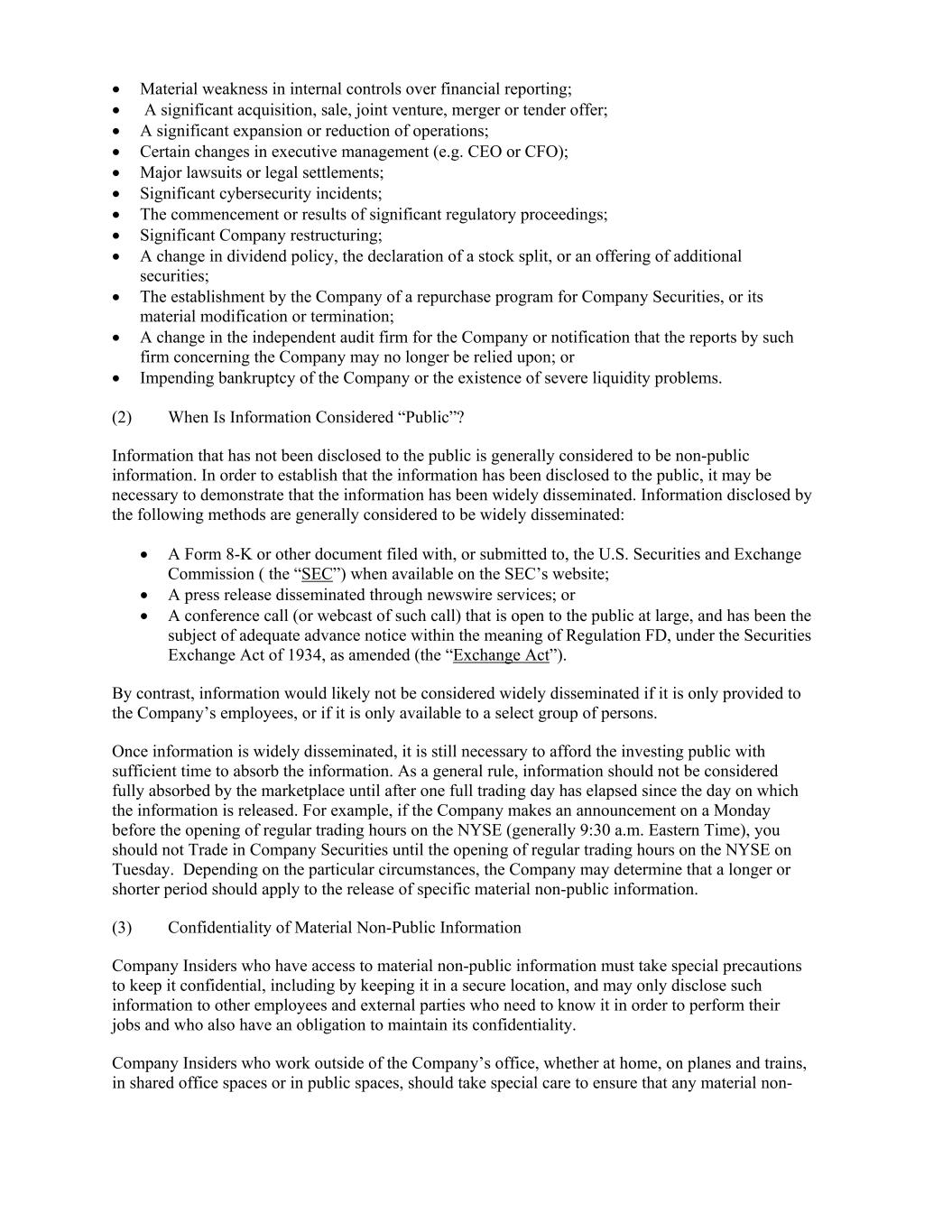
• Material weakness in internal controls over financial reporting; • A significant acquisition, sale, joint venture, merger or tender offer; • A significant expansion or reduction of operations; • Certain changes in executive management (e.g. CEO or CFO); • Major lawsuits or legal settlements; • Significant cybersecurity incidents; • The commencement or results of significant regulatory proceedings; • Significant Company restructuring; • A change in dividend policy, the declaration of a stock split, or an offering of additional securities; • The establishment by the Company of a repurchase program for Company Securities, or its material modification or termination; • A change in the independent audit firm for the Company or notification that the reports by such firm concerning the Company may no longer be relied upon; or • Impending bankruptcy of the Company or the existence of severe liquidity problems. (2) When Is Information Considered “Public”? Information that has not been disclosed to the public is generally considered to be non-public information. In order to establish that the information has been disclosed to the public, it may be necessary to demonstrate that the information has been widely disseminated. Information disclosed by the following methods are generally considered to be widely disseminated: • A Form 8-K or other document filed with, or submitted to, the U.S. Securities and Exchange Commission ( the “SEC”) when available on the SEC’s website; • A press release disseminated through newswire services; or • A conference call (or webcast of such call) that is open to the public at large, and has been the subject of adequate advance notice within the meaning of Regulation FD, under the Securities Exchange Act of 1934, as amended (the “Exchange Act”). By contrast, information would likely not be considered widely disseminated if it is only provided to the Company’s employees, or if it is only available to a select group of persons. Once information is widely disseminated, it is still necessary to afford the investing public with sufficient time to absorb the information. As a general rule, information should not be considered fully absorbed by the marketplace until after one full trading day has elapsed since the day on which the information is released. For example, if the Company makes an announcement on a Monday before the opening of regular trading hours on the NYSE (generally 9:30 a.m. Eastern Time), you should not Trade in Company Securities until the opening of regular trading hours on the NYSE on Tuesday. Depending on the particular circumstances, the Company may determine that a longer or shorter period should apply to the release of specific material non-public information. (3) Confidentiality of Material Non-Public Information Company Insiders who have access to material non-public information must take special precautions to keep it confidential, including by keeping it in a secure location, and may only disclose such information to other employees and external parties who need to know it in order to perform their jobs and who also have an obligation to maintain its confidentiality. Company Insiders who work outside of the Company’s office, whether at home, on planes and trains, in shared office spaces or in public spaces, should take special care to ensure that any material non-
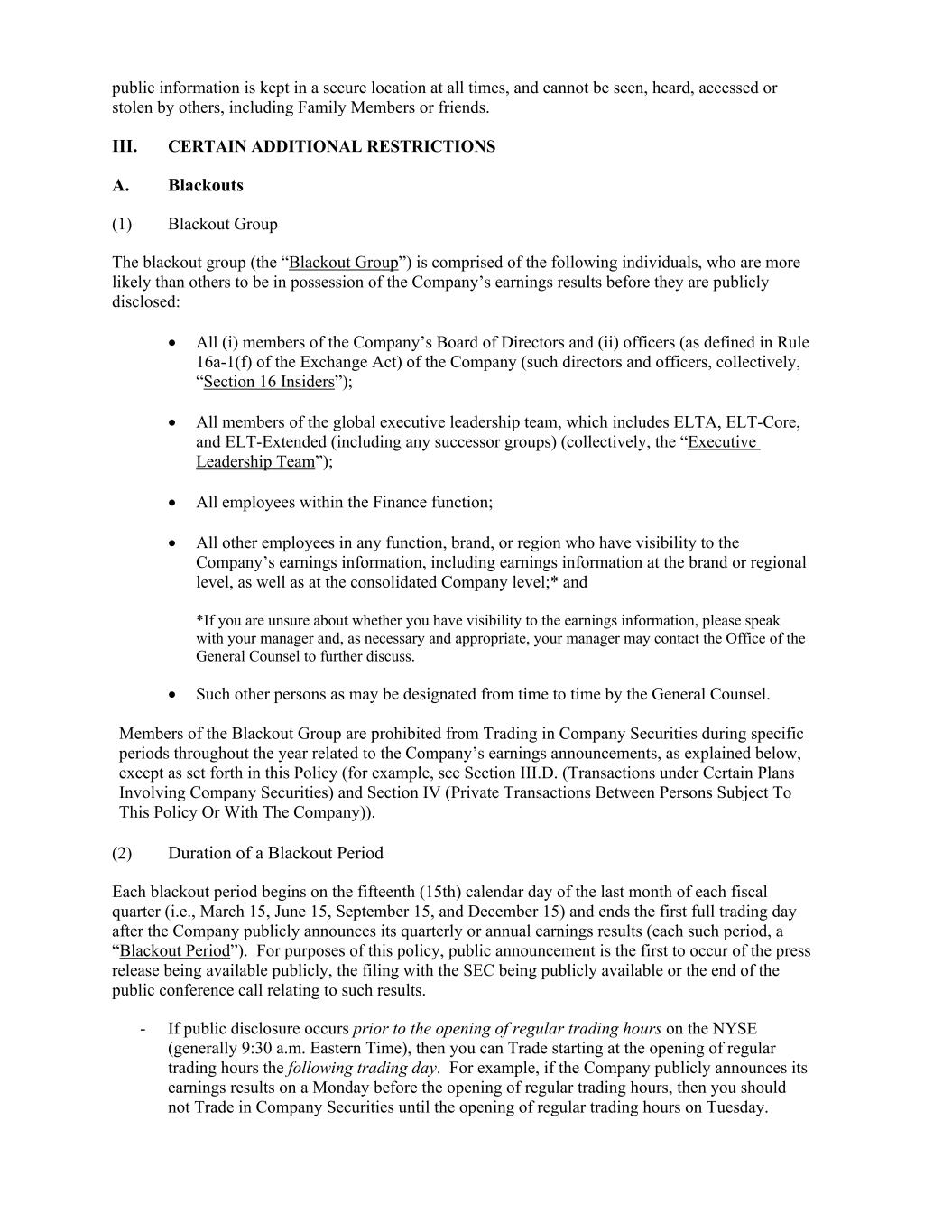
public information is kept in a secure location at all times, and cannot be seen, heard, accessed or stolen by others, including Family Members or friends. III. CERTAIN ADDITIONAL RESTRICTIONS A. Blackouts (1) Blackout Group The blackout group (the “Blackout Group”) is comprised of the following individuals, who are more likely than others to be in possession of the Company’s earnings results before they are publicly disclosed: • All (i) members of the Company’s Board of Directors and (ii) officers (as defined in Rule 16a-1(f) of the Exchange Act) of the Company (such directors and officers, collectively, “Section 16 Insiders”); • All members of the global executive leadership team, which includes ELTA, ELT-Core, and ELT-Extended (including any successor groups) (collectively, the “Executive Leadership Team”); • All employees within the Finance function; • All other employees in any function, brand, or region who have visibility to the Company’s earnings information, including earnings information at the brand or regional level, as well as at the consolidated Company level;* and *If you are unsure about whether you have visibility to the earnings information, please speak with your manager and, as necessary and appropriate, your manager may contact the Office of the General Counsel to further discuss. • Such other persons as may be designated from time to time by the General Counsel. Members of the Blackout Group are prohibited from Trading in Company Securities during specific periods throughout the year related to the Company’s earnings announcements, as explained below, except as set forth in this Policy (for example, see Section III.D. (Transactions under Certain Plans Involving Company Securities) and Section IV (Private Transactions Between Persons Subject To This Policy Or With The Company)). (2) Duration of a Blackout Period Each blackout period begins on the fifteenth (15th) calendar day of the last month of each fiscal quarter (i.e., March 15, June 15, September 15, and December 15) and ends the first full trading day after the Company publicly announces its quarterly or annual earnings results (each such period, a “Blackout Period”). For purposes of this policy, public announcement is the first to occur of the press release being available publicly, the filing with the SEC being publicly available or the end of the public conference call relating to such results. - If public disclosure occurs prior to the opening of regular trading hours on the NYSE (generally 9:30 a.m. Eastern Time), then you can Trade starting at the opening of regular trading hours the following trading day. For example, if the Company publicly announces its earnings results on a Monday before the opening of regular trading hours, then you should not Trade in Company Securities until the opening of regular trading hours on Tuesday.
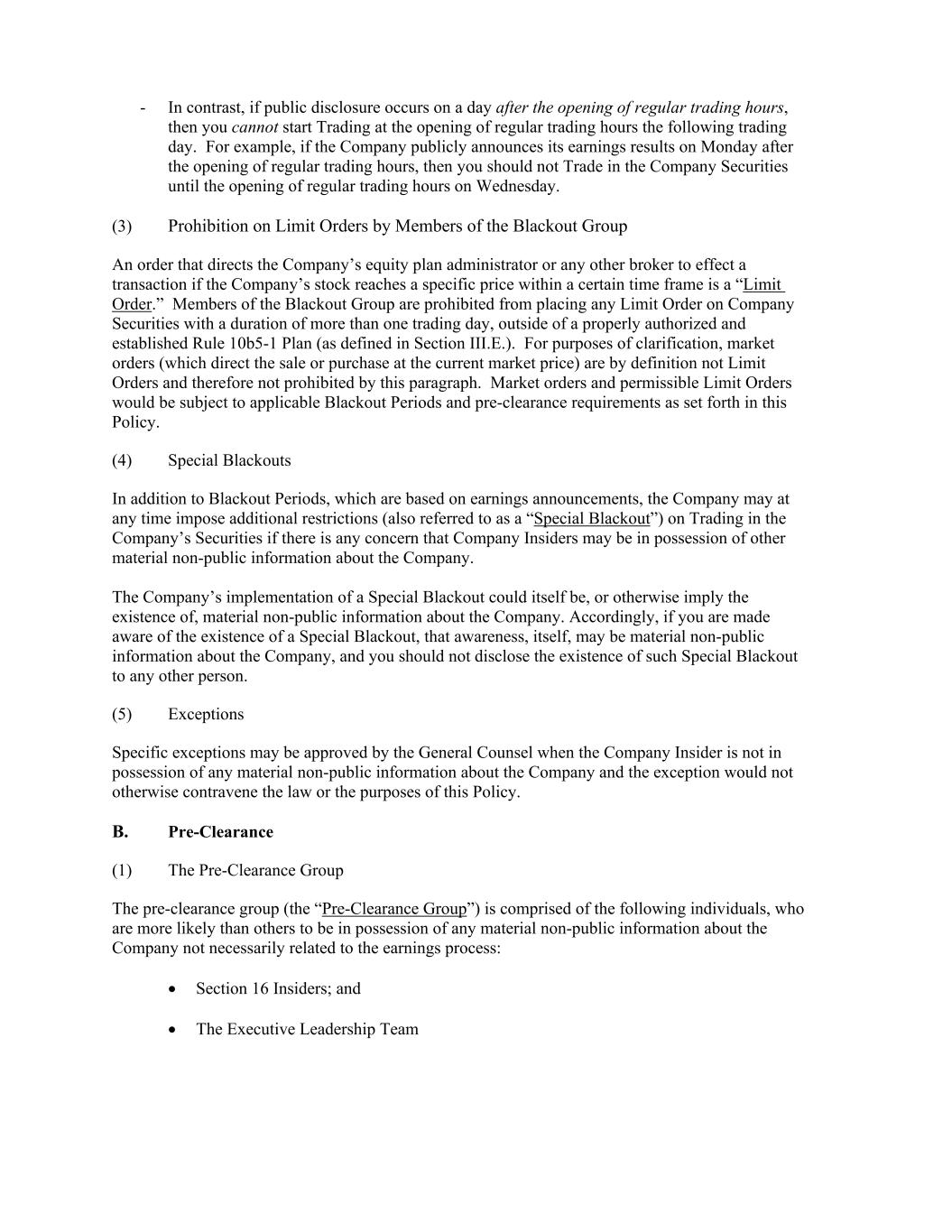
- In contrast, if public disclosure occurs on a day after the opening of regular trading hours, then you cannot start Trading at the opening of regular trading hours the following trading day. For example, if the Company publicly announces its earnings results on Monday after the opening of regular trading hours, then you should not Trade in the Company Securities until the opening of regular trading hours on Wednesday. (3) Prohibition on Limit Orders by Members of the Blackout Group An order that directs the Company’s equity plan administrator or any other broker to effect a transaction if the Company’s stock reaches a specific price within a certain time frame is a “Limit Order.” Members of the Blackout Group are prohibited from placing any Limit Order on Company Securities with a duration of more than one trading day, outside of a properly authorized and established Rule 10b5-1 Plan (as defined in Section III.E.). For purposes of clarification, market orders (which direct the sale or purchase at the current market price) are by definition not Limit Orders and therefore not prohibited by this paragraph. Market orders and permissible Limit Orders would be subject to applicable Blackout Periods and pre-clearance requirements as set forth in this Policy. (4) Special Blackouts In addition to Blackout Periods, which are based on earnings announcements, the Company may at any time impose additional restrictions (also referred to as a “Special Blackout”) on Trading in the Company’s Securities if there is any concern that Company Insiders may be in possession of other material non-public information about the Company. The Company’s implementation of a Special Blackout could itself be, or otherwise imply the existence of, material non-public information about the Company. Accordingly, if you are made aware of the existence of a Special Blackout, that awareness, itself, may be material non-public information about the Company, and you should not disclose the existence of such Special Blackout to any other person. (5) Exceptions Specific exceptions may be approved by the General Counsel when the Company Insider is not in possession of any material non-public information about the Company and the exception would not otherwise contravene the law or the purposes of this Policy. B. Pre-Clearance (1) The Pre-Clearance Group The pre-clearance group (the “Pre-Clearance Group”) is comprised of the following individuals, who are more likely than others to be in possession of any material non-public information about the Company not necessarily related to the earnings process: • Section 16 Insiders; and • The Executive Leadership Team
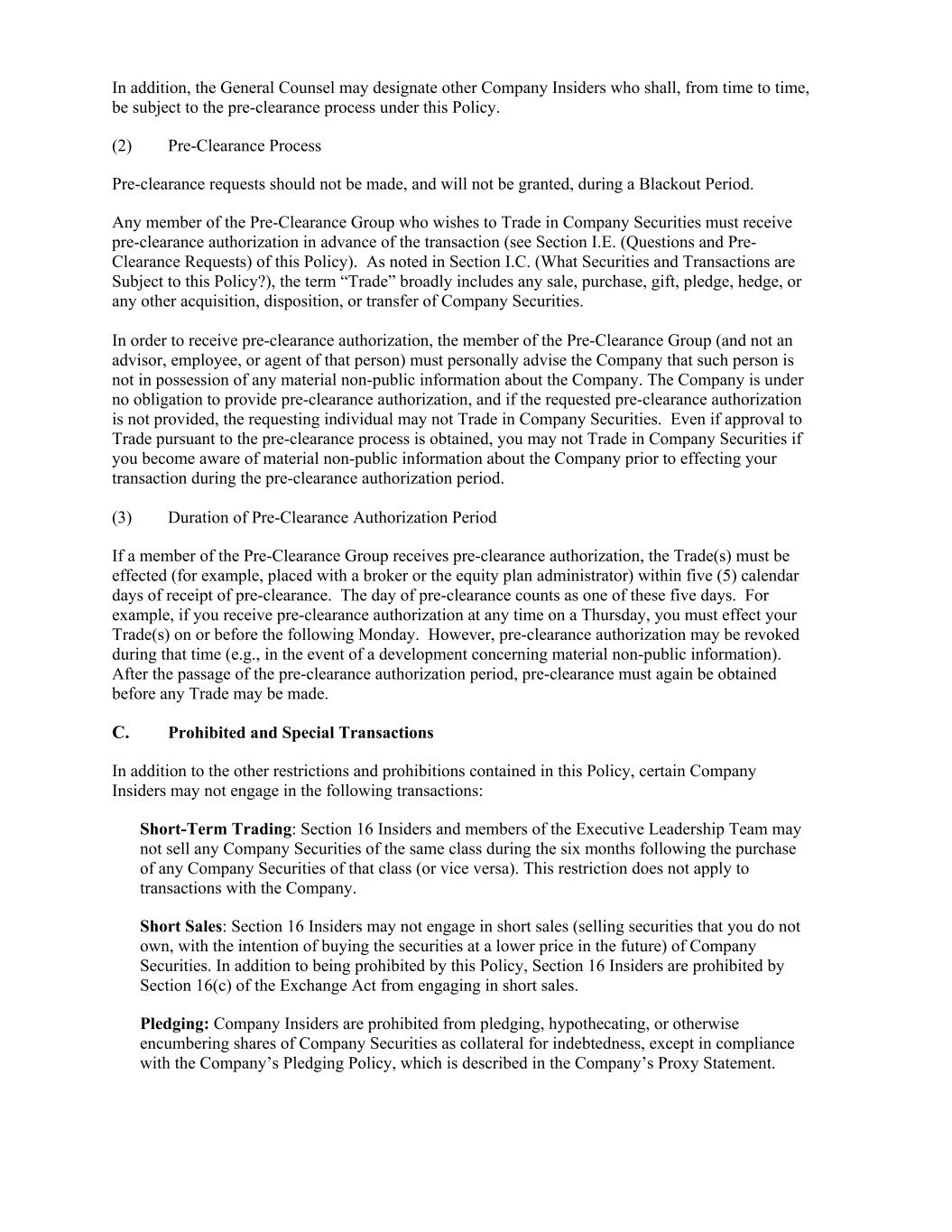
In addition, the General Counsel may designate other Company Insiders who shall, from time to time, be subject to the pre-clearance process under this Policy. (2) Pre-Clearance Process Pre-clearance requests should not be made, and will not be granted, during a Blackout Period. Any member of the Pre-Clearance Group who wishes to Trade in Company Securities must receive pre-clearance authorization in advance of the transaction (see Section I.E. (Questions and Pre- Clearance Requests) of this Policy). As noted in Section I.C. (What Securities and Transactions are Subject to this Policy?), the term “Trade” broadly includes any sale, purchase, gift, pledge, hedge, or any other acquisition, disposition, or transfer of Company Securities. In order to receive pre-clearance authorization, the member of the Pre-Clearance Group (and not an advisor, employee, or agent of that person) must personally advise the Company that such person is not in possession of any material non-public information about the Company. The Company is under no obligation to provide pre-clearance authorization, and if the requested pre-clearance authorization is not provided, the requesting individual may not Trade in Company Securities. Even if approval to Trade pursuant to the pre-clearance process is obtained, you may not Trade in Company Securities if you become aware of material non-public information about the Company prior to effecting your transaction during the pre-clearance authorization period. (3) Duration of Pre-Clearance Authorization Period If a member of the Pre-Clearance Group receives pre-clearance authorization, the Trade(s) must be effected (for example, placed with a broker or the equity plan administrator) within five (5) calendar days of receipt of pre-clearance. The day of pre-clearance counts as one of these five days. For example, if you receive pre-clearance authorization at any time on a Thursday, you must effect your Trade(s) on or before the following Monday. However, pre-clearance authorization may be revoked during that time (e.g., in the event of a development concerning material non-public information). After the passage of the pre-clearance authorization period, pre-clearance must again be obtained before any Trade may be made. C. Prohibited and Special Transactions In addition to the other restrictions and prohibitions contained in this Policy, certain Company Insiders may not engage in the following transactions: Short-Term Trading: Section 16 Insiders and members of the Executive Leadership Team may not sell any Company Securities of the same class during the six months following the purchase of any Company Securities of that class (or vice versa). This restriction does not apply to transactions with the Company. Short Sales: Section 16 Insiders may not engage in short sales (selling securities that you do not own, with the intention of buying the securities at a lower price in the future) of Company Securities. In addition to being prohibited by this Policy, Section 16 Insiders are prohibited by Section 16(c) of the Exchange Act from engaging in short sales. Pledging: Company Insiders are prohibited from pledging, hypothecating, or otherwise encumbering shares of Company Securities as collateral for indebtedness, except in compliance with the Company’s Pledging Policy, which is described in the Company’s Proxy Statement.
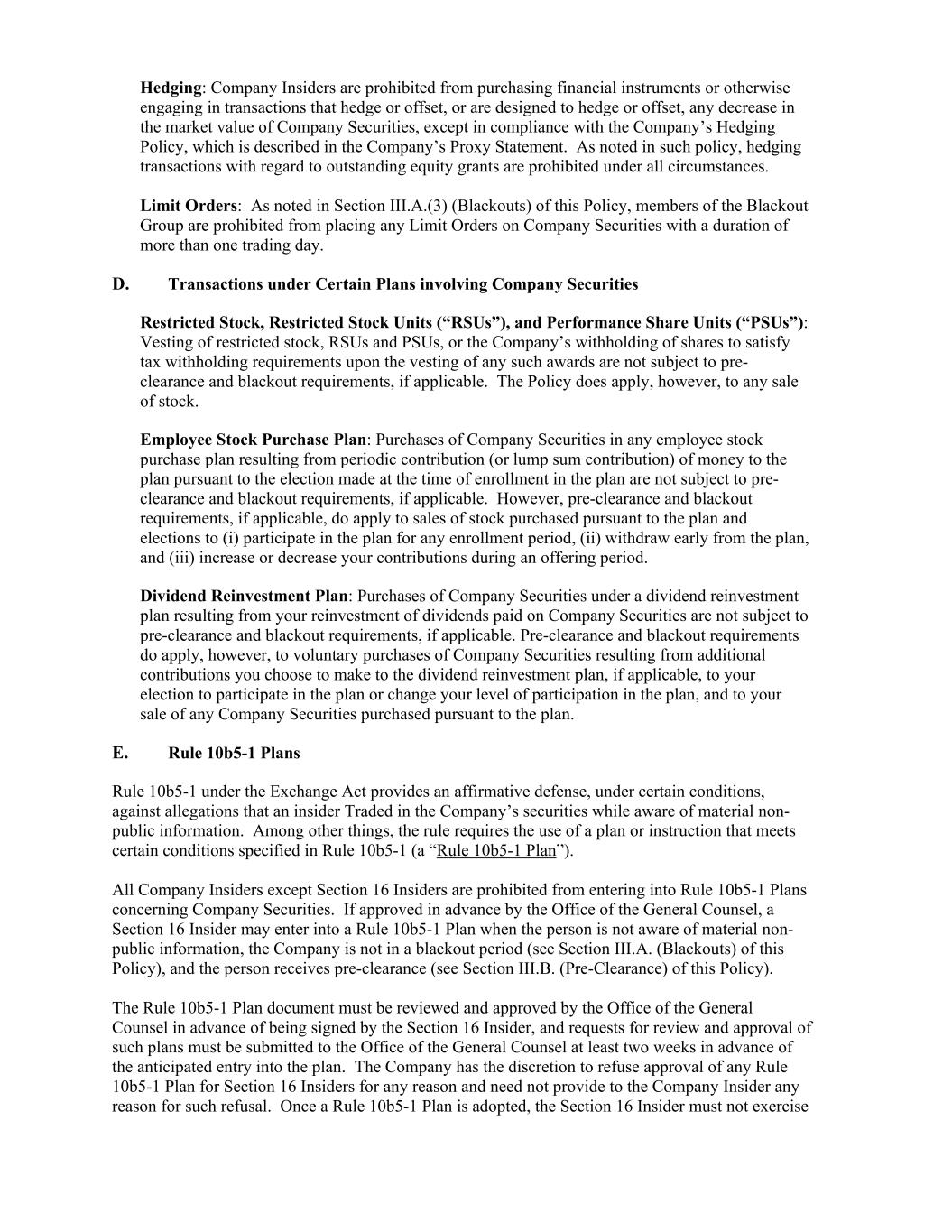
Hedging: Company Insiders are prohibited from purchasing financial instruments or otherwise engaging in transactions that hedge or offset, or are designed to hedge or offset, any decrease in the market value of Company Securities, except in compliance with the Company’s Hedging Policy, which is described in the Company’s Proxy Statement. As noted in such policy, hedging transactions with regard to outstanding equity grants are prohibited under all circumstances. Limit Orders: As noted in Section III.A.(3) (Blackouts) of this Policy, members of the Blackout Group are prohibited from placing any Limit Orders on Company Securities with a duration of more than one trading day. D. Transactions under Certain Plans involving Company Securities Restricted Stock, Restricted Stock Units (“RSUs”), and Performance Share Units (“PSUs”): Vesting of restricted stock, RSUs and PSUs, or the Company’s withholding of shares to satisfy tax withholding requirements upon the vesting of any such awards are not subject to pre- clearance and blackout requirements, if applicable. The Policy does apply, however, to any sale of stock. Employee Stock Purchase Plan: Purchases of Company Securities in any employee stock purchase plan resulting from periodic contribution (or lump sum contribution) of money to the plan pursuant to the election made at the time of enrollment in the plan are not subject to pre- clearance and blackout requirements, if applicable. However, pre-clearance and blackout requirements, if applicable, do apply to sales of stock purchased pursuant to the plan and elections to (i) participate in the plan for any enrollment period, (ii) withdraw early from the plan, and (iii) increase or decrease your contributions during an offering period. Dividend Reinvestment Plan: Purchases of Company Securities under a dividend reinvestment plan resulting from your reinvestment of dividends paid on Company Securities are not subject to pre-clearance and blackout requirements, if applicable. Pre-clearance and blackout requirements do apply, however, to voluntary purchases of Company Securities resulting from additional contributions you choose to make to the dividend reinvestment plan, if applicable, to your election to participate in the plan or change your level of participation in the plan, and to your sale of any Company Securities purchased pursuant to the plan. E. Rule 10b5-1 Plans Rule 10b5-1 under the Exchange Act provides an affirmative defense, under certain conditions, against allegations that an insider Traded in the Company’s securities while aware of material non- public information. Among other things, the rule requires the use of a plan or instruction that meets certain conditions specified in Rule 10b5-1 (a “Rule 10b5-1 Plan”). All Company Insiders except Section 16 Insiders are prohibited from entering into Rule 10b5-1 Plans concerning Company Securities. If approved in advance by the Office of the General Counsel, a Section 16 Insider may enter into a Rule 10b5-1 Plan when the person is not aware of material non- public information, the Company is not in a blackout period (see Section III.A. (Blackouts) of this Policy), and the person receives pre-clearance (see Section III.B. (Pre-Clearance) of this Policy). The Rule 10b5-1 Plan document must be reviewed and approved by the Office of the General Counsel in advance of being signed by the Section 16 Insider, and requests for review and approval of such plans must be submitted to the Office of the General Counsel at least two weeks in advance of the anticipated entry into the plan. The Company has the discretion to refuse approval of any Rule 10b5-1 Plan for Section 16 Insiders for any reason and need not provide to the Company Insider any reason for such refusal. Once a Rule 10b5-1 Plan is adopted, the Section 16 Insider must not exercise
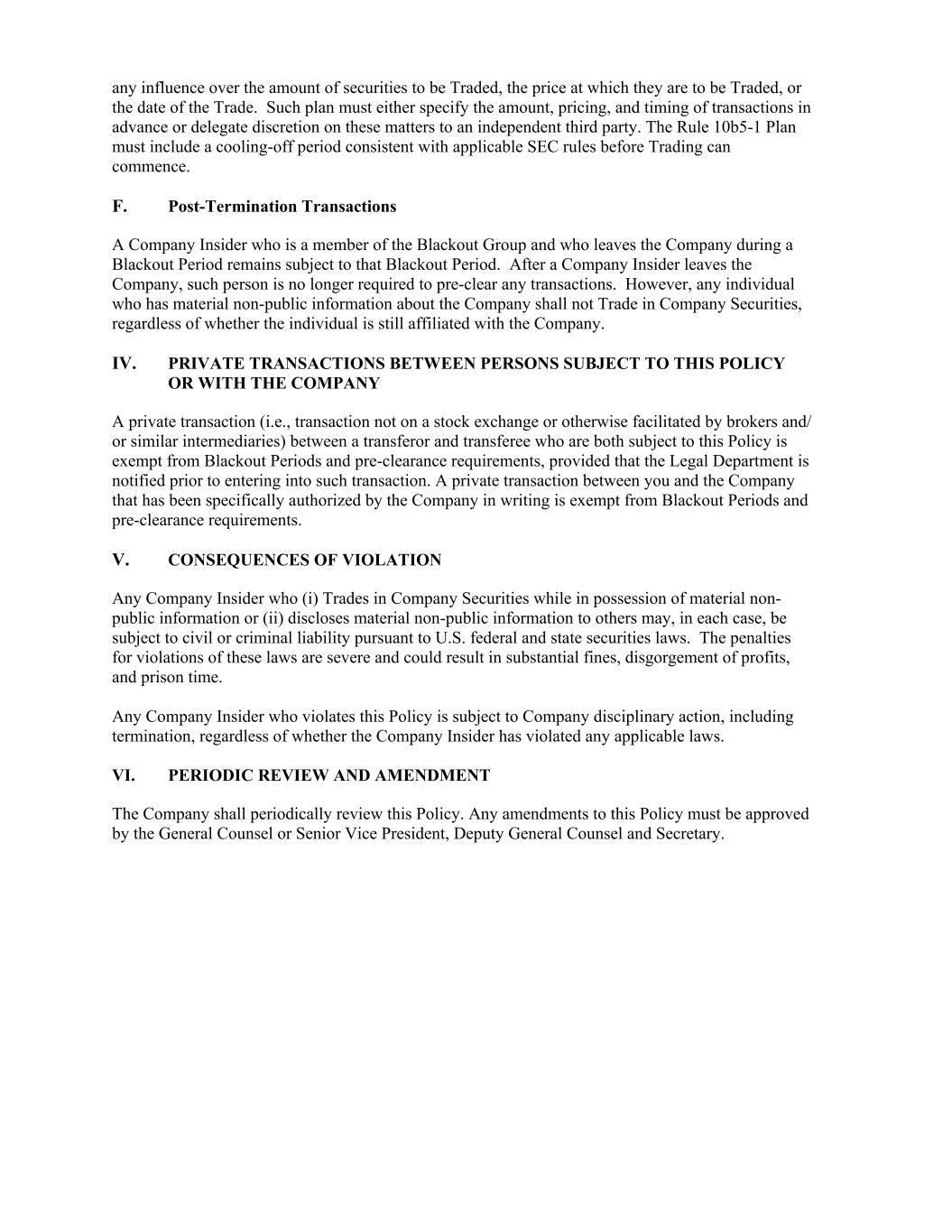
any influence over the amount of securities to be Traded, the price at which they are to be Traded, or the date of the Trade. Such plan must either specify the amount, pricing, and timing of transactions in advance or delegate discretion on these matters to an independent third party. The Rule 10b5-1 Plan must include a cooling-off period consistent with applicable SEC rules before Trading can commence. F. Post-Termination Transactions A Company Insider who is a member of the Blackout Group and who leaves the Company during a Blackout Period remains subject to that Blackout Period. After a Company Insider leaves the Company, such person is no longer required to pre-clear any transactions. However, any individual who has material non-public information about the Company shall not Trade in Company Securities, regardless of whether the individual is still affiliated with the Company. IV. PRIVATE TRANSACTIONS BETWEEN PERSONS SUBJECT TO THIS POLICY OR WITH THE COMPANY A private transaction (i.e., transaction not on a stock exchange or otherwise facilitated by brokers and/ or similar intermediaries) between a transferor and transferee who are both subject to this Policy is exempt from Blackout Periods and pre-clearance requirements, provided that the Legal Department is notified prior to entering into such transaction. A private transaction between you and the Company that has been specifically authorized by the Company in writing is exempt from Blackout Periods and pre-clearance requirements. V. CONSEQUENCES OF VIOLATION Any Company Insider who (i) Trades in Company Securities while in possession of material non- public information or (ii) discloses material non-public information to others may, in each case, be subject to civil or criminal liability pursuant to U.S. federal and state securities laws. The penalties for violations of these laws are severe and could result in substantial fines, disgorgement of profits, and prison time. Any Company Insider who violates this Policy is subject to Company disciplinary action, including termination, regardless of whether the Company Insider has violated any applicable laws. VI. PERIODIC REVIEW AND AMENDMENT The Company shall periodically review this Policy. Any amendments to this Policy must be approved by the General Counsel or Senior Vice President, Deputy General Counsel and Secretary.
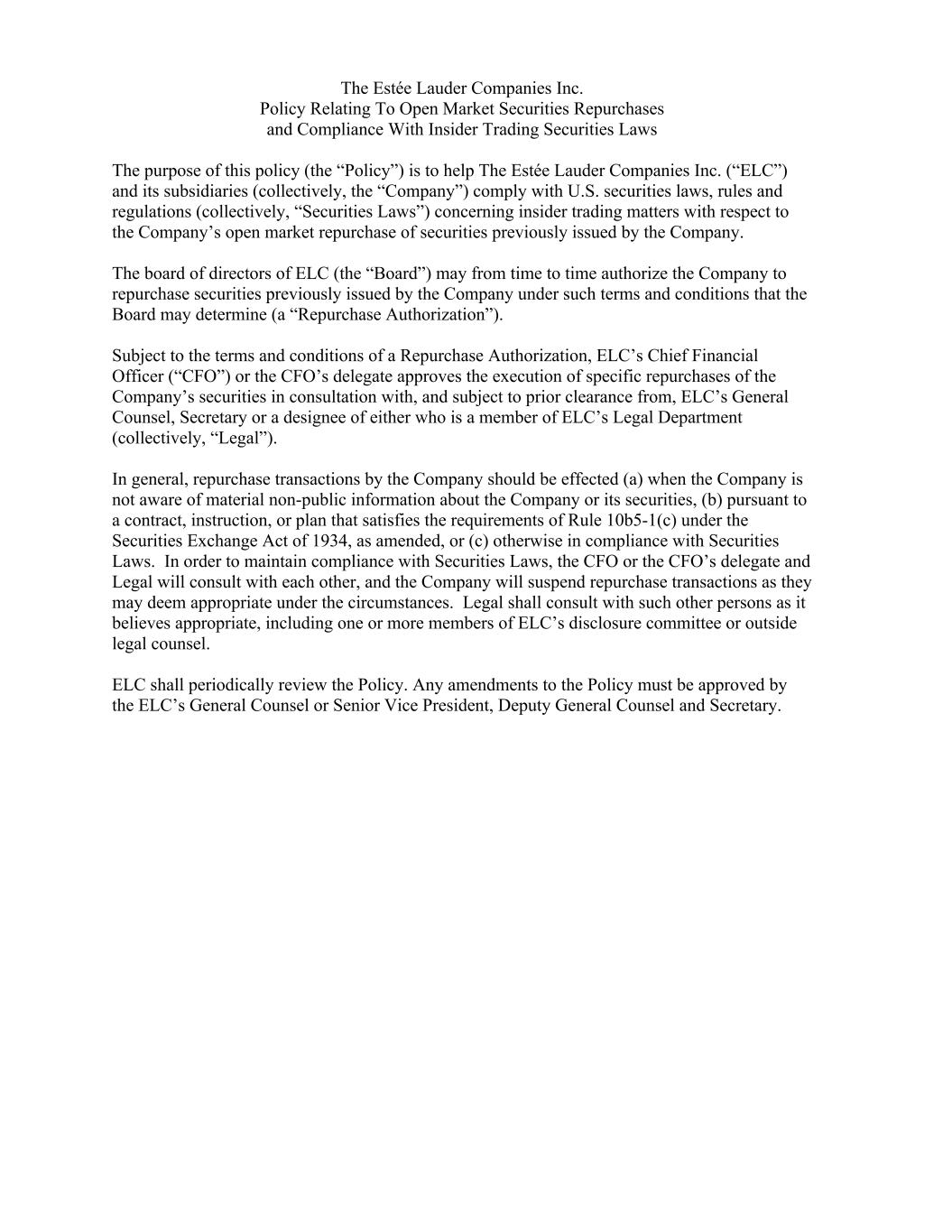
The Estée Lauder Companies Inc. Policy Relating To Open Market Securities Repurchases and Compliance With Insider Trading Securities Laws The purpose of this policy (the “Policy”) is to help The Estée Lauder Companies Inc. (“ELC”) and its subsidiaries (collectively, the “Company”) comply with U.S. securities laws, rules and regulations (collectively, “Securities Laws”) concerning insider trading matters with respect to the Company’s open market repurchase of securities previously issued by the Company. The board of directors of ELC (the “Board”) may from time to time authorize the Company to repurchase securities previously issued by the Company under such terms and conditions that the Board may determine (a “Repurchase Authorization”). Subject to the terms and conditions of a Repurchase Authorization, ELC’s Chief Financial Officer (“CFO”) or the CFO’s delegate approves the execution of specific repurchases of the Company’s securities in consultation with, and subject to prior clearance from, ELC’s General Counsel, Secretary or a designee of either who is a member of ELC’s Legal Department (collectively, “Legal”). In general, repurchase transactions by the Company should be effected (a) when the Company is not aware of material non-public information about the Company or its securities, (b) pursuant to a contract, instruction, or plan that satisfies the requirements of Rule 10b5-1(c) under the Securities Exchange Act of 1934, as amended, or (c) otherwise in compliance with Securities Laws. In order to maintain compliance with Securities Laws, the CFO or the CFO’s delegate and Legal will consult with each other, and the Company will suspend repurchase transactions as they may deem appropriate under the circumstances. Legal shall consult with such other persons as it believes appropriate, including one or more members of ELC’s disclosure committee or outside legal counsel. ELC shall periodically review the Policy. Any amendments to the Policy must be approved by the ELC’s General Counsel or Senior Vice President, Deputy General Counsel and Secretary.